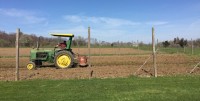Event Details
Date
November 10, 2016
Time
6:00-8:00
Location
CCE Ulster Count
232 Plaza Road (Hannaford Plaza)
Kingston, NY 12401
Cost
This event is free.
Host
CCE Ulster County
Carrie Doyle
845-340-3990 x311
email Carrie Doyle
ulster.cce.cornell.edu/events/2016/11/10/se
Setting Rent for Farmland
November 10, 2016
One of the biggest challenges farmers and landowners in the Hudson Valley have is knowing how to set a rental rate or assess a rent offer for farmland. The wide variety of land types, land uses and business needs, as well as subsidies like the NYS ag land tax assessment program, makes it challenging to set and compare different land rental rates.
CCE Ulster County will host a workshop covering the different tools and methods for setting and evaluating farmland rental rates. Elizabeth Higgins, Ag Business Management Specialist for the Eastern New York Commercial Horticulture Program, will show different tools that can be used to compare properties to help you set a reasonable rental rate for farmland. Rental rates from both the perspective of the landowner and the renter will also be covered.
This program is supported by the Local Economies Project and by the Hudson Valley Farmlink Network, which is coordinated by American Farmland Trust and has received primary funding from the Doris Duke Charitable Foundation.
Thanks to their support, this program is free. Refreshments will be served.
Space is limited, please RSVP by Monday, November 7 with the name, phone & email of attendees, to Carrie at 845-340-3990 x311 or email cad266@cornell.edu.



































